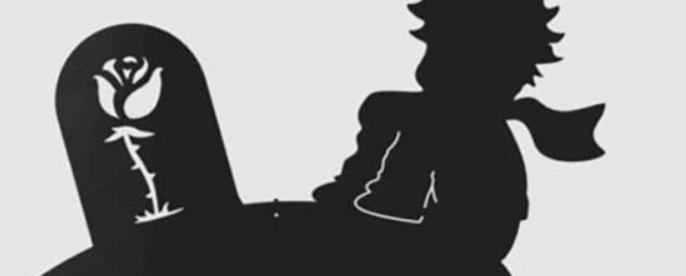It seemed to me a corny and meaningless book that exploits self-centeredness, manipulating emotions and feelings such as melancholy and loneliness, playing with ambiguity to provoke reactions in the readers, which were disturbing to me when I saw them.
I remember it as an enhancer of insanity, self-centeredness, and lack of empathy. It’s a story that seems profound because it doesn’t make any sense, but is able to randomly activate brains, which I found terrifying. When I listened to the excited people interpreting it, I felt as if I was listening to religious fanatics speaking of the instructions that a god had given them in dreams.
Somehow it has the genius to connect with the existential emptiness and the terrible loneliness of being one separated from everything else. Yes, in that sense it is great. But instead of channeling this feeling into a positive and loving act, or at least helping to understand it, what it does is appease it like a damn artificial sweetener. It is not nutritious, it is a trick for the tongue that takes away hunger but does not feed. Intellectual and emotional junk food that entertains the spirit, throwing it off.
Is a frivolous book. It does not offer solutions or illuminate reality. It only connects with sadness and anguish, capturing attention without knowing what to do next, like a conjurer, like a false guru, like a Pied Piper of Hamelin leading the rats to the abyss.
It’s like a video game or a movie that entertains but leaves you empty afterwards, as if that time had not existed, as if it had been stolen. Leaving you with that feeling of having wasted the afternoon, of having wasted the weekend, of having wasted life. Yes, it took away your sadness for a while, but it made you addicted, leaving you with even deeper sadness, wanting the damn drug again, making you damned addicted to it.
It should be no more than a silly fairy tale with corny drawings, but it’s terrifying to see how people react to it. Terrifying all the suffering that reveals, suffering that is the fruit of the veil of the “I”. And terrifying that it is not able to remove the blindfold, not even to open a slit, but rather reinforces it and spins it more so that it never falls off.
Manu Herrán. June 7, 2018.
***
Despite my harsh criticism of the work, I recognize its genius, and I have nothing against the author, nor any negative intuition towards him. What happens to me is that I think it is a toxic work, which promotes self-centeredness and lack of empathy for others, creating and fostering illusions to sustain this self-centeredness and lack of empathy.
Human beings, and animals in general, are disgusting and immoral. I know wonderful people who enjoy bullfights, in which a being whose physical experiences are similar to ours are literally tortured to death. There are illusions and mental constructions that support this nonsense. And I think this book is capable of creating those kinds of toxic illusions where lack of empathy is encouraged. My feeling is that whoever reads the book finds in it justifications for being cruel and indifferent, justifications for being a selfish child all his life.
Antoine de Saint-Exupéry seems to have been able to dive deep into human psychology, and of course what he has found is fear and vanity; selfishness and cruelty. For example, the book starts quite naturally describing animals eating each other. It is disgusting how the book successfully fosters this indifference.
Perhaps the most powerful force against empathy in general (and against Effective Altruism and the idea that suffering matters for itself, regardless of who the individual experiencing it is) is the exclusive love to a particular person or group, for instance terribly confusing sexual or affective exclusivity with other things. The cruelest acts can be carried out with the excuse of love for the couple (the murder of a sexual rival), or for the children (the murder of a emotional rival), or for the family (cheating and lying at work, to bring bread home, taking it away from another), or the community (the war against another country), or humanity (indifference to animal suffering). Fostering this is disgusting.
There is something that we call “Love” and that certain illusions can make us believe that it is love, that it is nothing but fear, vanity and selfishness. And that may be the excuse to ignore tons of suffering in others.
Other critics to “The litte prince”
- “I just…don’t like it. It scares me. This could come off as sheer contrarian perversity, but I can assure you it dates back to babyhood, when I cried, screamed and threw the book across the room when it was proferred as a bedtime story because I didn’t like the Prince’s hollow eyes.
…
When you think about it, The Little Prince tugs at some of childhood’s deepest fears: abandonment, loneliness, an arbitrary universe ruled by adult whims and mysterious convention. Snowsuits. What can be intended as redemptive can read instead as punishment and cruelty. And as a fable, the moral, to a child, can seem obscure at best.” Source - “Countless children have been forced to suffer though the brutally false profundity of Antoine de Saint-Exupéry’s 1943 book, and in the dark, inescapable future, countless more will silently beg for the sweet release of death while being subjected to its cruel smugness and hollow tweeness. Then these children too will grow old, and forget how truly horrific The Little Prince is, and inflict Antoine de Saint-Exupéry’s never-ending ouroboros of pain upon the next generation. This endless, heinous crime is particularly prevalent in France, because of course it is.” Source

1 Comment